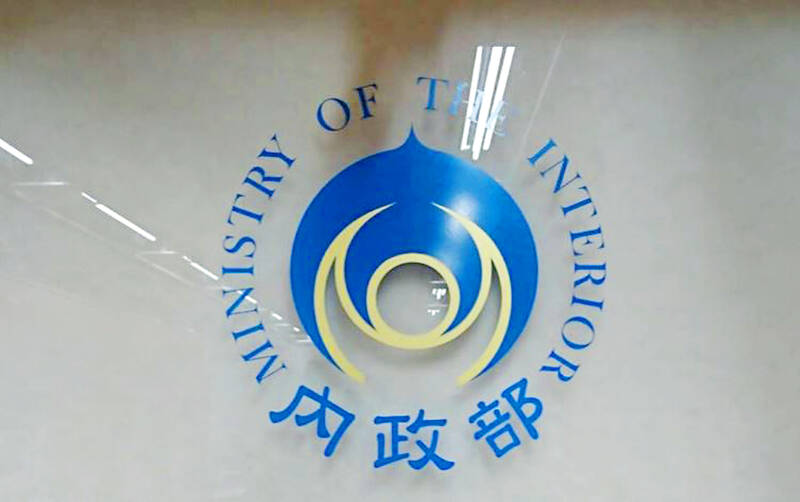New immigration rules would bar people who have committed sexual offenses against children from becoming citizens, the Ministry of the Interior (MOI) said yesterday.
It is seeking to amend articles 2 and 3 of the Regulations for the Assessment Criteria of No Illicit or Illegal Behavior (歸化國籍無不良素行認定辦法), the ministry said.
The update would be based on the Nationality Act (國籍法), which stipulates that foreigners applying for citizenship must “have no bad conduct and have no criminal records as certified by the police clearance certificate,” it said, adding that this would bar offenders, including those who have committed sexual offenses against children, from naturalization until the criminal record entry expires.

Photo: Huang Hsin-po, Taipei Times
That usually happens when the offender has served their sentence, paid the imposed fine, or their deferred prosecution or suspended sentence expired, it said.
In January, the ministry promulgated changes to residence permit regulations, imposing more stringent curbs on applicants who have been found guilty of spousal or child abuse, it said.
The requirements for naturalization would be changed considering that they should be more rigorous than those for residency, it said.
Articles 2 and 3 would be amended to contain a clause that bars citizenship applicants who were found guilty of child abuse by a court or other agencies, it said.
The amendments would define child abuse as sexual assault, sexual exploitation, sexual harassment, stalking of a minor and other contraventions of regulations governing child welfare, it said.
Such entries would remain on the criminal record until at least three years after the offender is released from prison or has paid their fine provided that they do not commit any new offenses in the meantime, it said.
The amendments would be promulgated in due course, it added.

US President Donald Trump said "it’s up to" Chinese President Xi Jinping (習近平) what China does on Taiwan, but that he would be "very unhappy" with a change in the "status quo," the New York Times said in an interview published yesterday. Xi "considers it to be a part of China, and that’s up to him what he’s going to be doing," Trump told the newspaper on Wednesday. "But I’ve expressed to him that I would be very unhappy if he did that, and I don’t think he’ll do that," he added. "I hope he doesn’t do that." Trump made the comments in

NOT AN OPENING: Trump’s violation of international law does not affect China’s consideration in attacking Taiwan; Beijing lacks capability, not precedent, an official said Taiwanese officials see the US’ capture of the president of Venezuela as a powerful deterrent to Beijing’s aggression and a timely reminder of the US’ ability to defeat militaries equipped with Chinese-made weapons. The strikes that toppled Venezuelan President Nicolas Maduro signaled to authoritarian leaders, including Chinese President Xi Jinping (習近平), US President Donald Trump’s willingness to use military might for international affairs core to US interests, one senior official in Taipei’s security circle said. That reassured Taiwan, the person said. Taipei has also dismissed the idea that Trump’s apparent violation of international law could embolden Beijing, said the official, who was not

A cold surge advisory was today issued for 18 cities and counties across Taiwan, with temperatures of below 10°C forecast during the day and into tonight, the Central Weather Administration (CWA) said. New Taipei City, Taipei, Taoyuan and Hsinchu, Miaoli and Yilan counties are expected to experience sustained temperatures of 10°C or lower, the CWA said. Temperatures are likely to temporarily drop below 10°C in most other areas, except Taitung, Pingtung, Penghu and Lienchiang (Matsu) counties, CWA data showed. The cold weather is being caused by a strong continental cold air mass, combined with radiative cooling, a process in which heat escapes from

Snow this morning fell on Alishan for the first time in seven years, as a strong continental cold air mass sent temperatures plunging across Taiwan, the Central Weather Administration (CWA) said. The Alishan weather station, located at an elevation of about 2,200m in central Taiwan, recorded snowfall from 8:55am to 9:15am, when the temperature dropped to about 1°C, the CWA said. With increased moisture and low temperatures in the high-altitude Alishan area, the conditions were favorable for snow, CWA forecaster Tsai Yi-chi (蔡伊其) said. The last time snow fell at the Alishan weather station was on Jan. 10, 2018, while graupel fell there